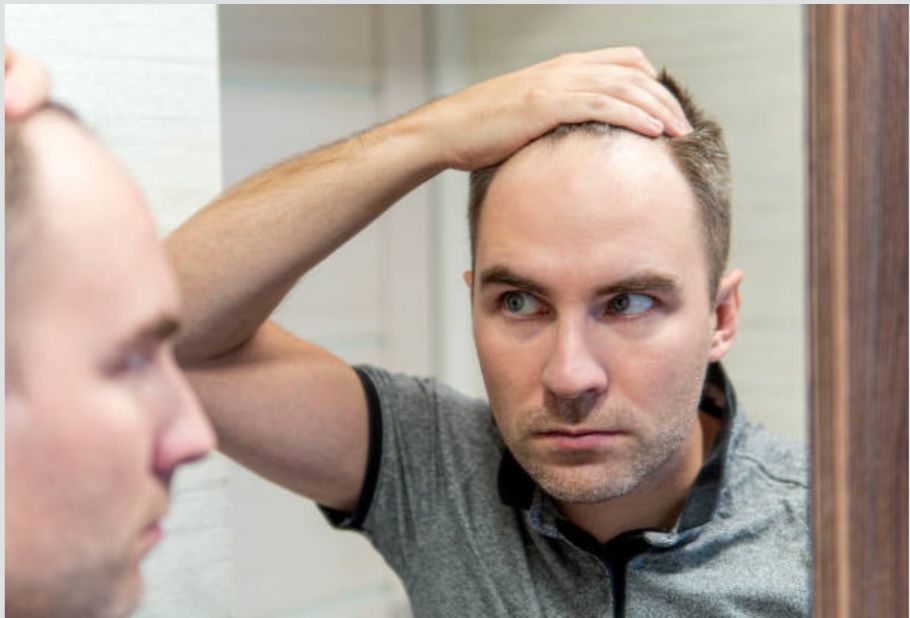Ketogenic diet has become increasingly popular due to its potential benefits for weight loss and overall health. However, some individuals experience an unexpected side effect of hair loss while on this diet. This can raise concerns for those who are new to the diet or are unsure of the underlying causes. In this article, we’ll explore the hair loss on keto diet and hair loss, delving into why it happens and how you can address it.
What Is the Keto Diet?
The ketogenic diet is a high-fat, moderate-protein, and low-carbohydrate eating plan designed to shift the body’s primary energy source from carbohydrates to fats. When following the keto diet, the goal is to significantly reduce carbohydrate intake—typically to around 20-50 grams per day—and increase fat consumption. By doing so, the body enters a metabolic state known as ketosis, where it begins to burn fat for energy instead of carbohydrates.
In normal circumstances, the body converts carbohydrates into glucose, which is the primary source of energy. However, by drastically limiting carbs, the body has to find an alternative fuel source. This is where ketones come in. Ketones are molecules produced in the liver from the breakdown of fats, and they become the body’s main source of energy when in ketosis.
By maintaining this state of ketosis, the keto diet is said to help with weight loss, improve cognitive function, and provide stable energy levels throughout the day. However, like any dietary change, the transition to a ketogenic lifestyle can cause some temporary side effects as the body adjusts, including potential hair loss.
Can Keto Diet Cause Hair Loss?
One of the most common questions asked by individuals new to the keto diet is: “Can the keto diet cause hair loss?” The short answer is yes, some people do experience hair loss on the keto diet. However, it’s important to understand why this happens and how you can prevent or mitigate it.
1. Rapid Weight Loss and Its Effects
The keto diet is highly effective for weight loss, especially in the early stages when people may shed a significant amount of weight quickly. While this is often seen as a positive outcome, rapid weight loss can sometimes lead to hair loss. This phenomenon occurs because the body views drastic changes in weight as stress. When your body is under stress, it prioritizes essential functions, such as heart and brain health, and conserves resources in less essential areas like hair growth.
Hair growth follows a natural cycle with phases of growth, rest, and shedding. When stress levels increase due to sudden weight loss, your hair may enter the resting phase (telogen) prematurely, leading to shedding several weeks or months later. This condition is known as telogen effluvium, a temporary form of hair loss that can happen in response to significant bodily changes, including a shift in diet like the ketogenic diet.
2. Nutritional Deficiencies and Hair Loss on Keto
Another potential reason for hair loss from the keto diet is nutritional deficiencies. The keto diet, when not properly planned, can sometimes lead to a lack of essential nutrients that are vital for hair health. Hair growth is closely linked to the presence of adequate vitamins and minerals, and a deficiency in any of these can result in thinning hair or hair loss.
- Biotin: Biotin, or vitamin B7, is a crucial nutrient for healthy hair, skin, and nails. While many foods that are high in carbohydrates (like whole grains) are good sources of biotin, these are typically limited on a strict ketogenic diet. Low levels of biotin may contribute to hair thinning or shedding.
- Protein Deficiency: While the keto diet emphasizes fat intake, it’s still important to consume an adequate amount of protein. Hair is made up of a protein called keratin, and if your protein intake is too low, it can impair hair growth. A lack of protein can lead to weak, brittle hair that breaks easily.
- Vitamins and Minerals: Vitamins such as A, D, E, and minerals like zinc and iron play vital roles in maintaining healthy hair. Deficiencies in these nutrients can occur if your diet is not balanced. Zinc, for example, is critical for tissue repair and cell division, which directly affects hair growth. Low iron levels, particularly in women, can result in hair loss because iron helps transport oxygen to hair follicles.
If you’re experiencing hair loss on keto, consider evaluating your intake of these vital nutrients. Incorporating a variety of whole foods, including leafy greens, fatty fish, eggs, and nuts, can help ensure you’re getting a wide range of vitamins and minerals. Additionally, taking a high-quality multivitamin or biotin supplement may help mitigate hair loss from nutritional deficiencies.
3. Stress and Hormonal Changes
The keto diet can also cause changes in the body’s hormone levels, which might lead to hair loss. For example, the thyroid gland, which plays a crucial role in regulating metabolism, can be affected by changes in diet. While there is no direct evidence to suggest that the keto diet negatively impacts thyroid function for everyone, some individuals may experience a decrease in thyroid hormones, which can contribute to hair thinning.
Furthermore, the body undergoes a significant adjustment period when transitioning to ketosis. During this time, the stress of adapting to a new energy source can affect your body’s cortisol levels, which are linked to stress response. Elevated cortisol levels can trigger hair loss, as chronic stress disrupts the hair growth cycle and may cause premature shedding.
YOU MAY ALSO LIKE: The Science Behind Ketosis Strips
Common Causes of Hair Loss on the Ketogenic Diet
Nutrient Deficiency
One common cause of hair loss on the ketogenic diet is nutrient deficiency. Certain vitamins and minerals play a crucial role in maintaining healthy hair, and a lack of these nutrients can lead to hair thinning or shedding.
- Biotin: Biotin is essential for hair growth, and a deficiency can cause hair loss.
- Food Sources: Eggs, almonds, spinach, and cauliflower are excellent sources of biotin.
- Supplements: Biotin supplements are available in most health stores and can help if you’re not getting enough from your diet.
- Zinc: Zinc is important for hair tissue growth and repair. Low zinc levels may disrupt the hair growth cycle.
- Food Sources: Beef, pumpkin seeds, and oysters are rich in zinc.
- Supplements: Zinc supplements can be taken to compensate for any dietary gaps.
- Iron: Iron deficiency, especially in women, can lead to hair loss by limiting the amount of oxygen that reaches hair follicles.
- Food Sources: Spinach, red meat, and lentils are iron-rich foods.
- Supplements: Iron supplements are often recommended if you’re low on this nutrient.
- Protein: Since hair is made primarily of protein, a protein deficiency can directly contribute to hair loss.
- Food Sources: Chicken, beef, fish, and tofu are high in protein and keto-friendly.
- Supplements: Protein shakes or powders can also help meet daily requirements.
Rapid Weight Loss and Hair Shedding
Another reason for hair loss when following a ketogenic diet is rapid weight loss, which can lead to a condition called telogen effluvium. This condition occurs when sudden or significant stress on the body, such as rapid weight loss, causes more hair follicles to enter the resting phase, leading to excessive shedding. If you’re losing hair on keto diet, it could be due to this natural response as the body adjusts to the new eating habits and weight changes.
Hormonal Imbalance
The ketogenic diet can also impact hormonal balance, which may result in temporary hair thinning. For example:
- Cortisol: The stress hormone cortisol can increase during the initial stages of keto, especially if you’re also exercising intensely or experiencing sleep disturbances. Elevated cortisol levels can lead to hair thinning.
- Thyroid Function: A very low-carb diet may affect thyroid hormone levels, particularly by reducing the production of T3, an active thyroid hormone essential for hair growth. Lower T3 levels can slow down metabolism and trigger hair loss in some individuals.
In most cases, the body will adjust over time, but if hormonal imbalances persist, it’s essential to consult with a healthcare provider to monitor your levels and make necessary adjustments to your diet or lifestyle.
How to Prevent Hair Loss on the Keto Diet
Ensure Proper Nutrient Intake
One of the most important aspects of preventing hair loss on the keto diet is making sure you’re getting the right nutrients. While keto is high in fat and low in carbs, your body still needs an adequate supply of proteins, vitamins, and minerals to maintain healthy hair.
- Protein: Hair is made up of keratin, a type of protein, so make sure you’re consuming enough high-quality protein. Aim for foods like eggs, chicken, fish, and tofu to keep your hair strong.
- Vitamins and Minerals: Nutrient deficiencies can contribute to hair thinning. Focus on foods rich in biotin, zinc, and iron. Some great keto-friendly sources include:
- Biotin: Eggs, salmon, and nuts (like almonds and walnuts)
- Zinc: Pumpkin seeds, beef, and oysters
- Iron: Spinach, red meat, and liver
Additionally, consider taking a multivitamin or hair supplement if you’re worried about deficiencies.
Avoid Extreme Caloric Deficit
Cutting calories too drastically can cause your body to go into a stress response, which may lead to hair loss. While the keto diet is effective for weight loss, you should avoid an extreme caloric deficit.
- Balanced Caloric Intake: Make sure you are eating enough to support your body’s needs, even while in ketosis. A slow and steady weight loss approach will help preserve your hair’s health. Consult with a nutritionist to calculate your daily caloric needs and stick to a balanced intake to avoid nutritional deficiencies that can affect your hair.
Manage Stress and Sleep
Stress and lack of sleep are significant contributors to hair loss. When the body is under stress, whether physical (from a strict diet) or emotional, it can trigger hair shedding.
- Stress Management: Practice stress-reducing activities like yoga, meditation, or deep-breathing exercises. These techniques can help keep your cortisol levels in check, which may minimize hair loss.
- Adequate Sleep: Aim for 7-9 hours of sleep each night. Quality sleep is essential for overall health, and it allows your body to repair and regenerate, which includes hair growth.
How to Regrow Hair After Keto Diet Hair Loss
Time and Patience
Hair loss due to the ketogenic diet is often a temporary side effect. While it can be alarming, especially when shedding is noticeable, it’s important to understand that regrowth takes time. The body needs time to adjust after the stress caused by rapid weight loss or changes in nutrition, which can lead to a condition known as telogen effluvium. This type of hair loss typically resolves within a few months as the body balances out. Hair follicles gradually return to the growth phase, but visible improvement may take anywhere from three to six months or longer, depending on individual factors.
Consider Supplements
To encourage regrowth, consider incorporating hair-healthy supplements into your routine. Nutrients like biotin, zinc, omega-3 fatty acids, and collagen are particularly beneficial for hair strength and growth. Biotin, also known as vitamin B7, plays a key role in keratin production, while omega-3s help reduce inflammation and promote scalp health. Many people experiencing ketogenic diet hair loss also benefit from supplementing with vitamins D and E, which support follicle function and scalp circulation. However, always consult a healthcare provider before starting any supplement to ensure it fits your specific needs.
FAQs About Hair Loss on Keto
1. Can keto cause permanent hair loss?
Keto-related hair loss is usually temporary and not permanent. Hair loss on the ketogenic diet is often linked to the body’s adjustment to lower carb intake, rapid weight loss, or a lack of nutrients. Once the body adapts and nutrient deficiencies are addressed, hair typically regrows. However, if hair loss persists for an extended period, it may be a sign of other underlying issues and should be discussed with a healthcare provider.
2. How long does hair loss last on keto?
Hair loss on keto typically lasts for a few weeks to a few months. This phase, often referred to as “telogen effluvium,” occurs when a significant amount of hair shifts into the resting phase due to changes like rapid weight loss or dietary shifts. Once the body stabilizes and adapts to the new diet, hair growth generally resumes within 3-6 months.
3. What vitamins should I take to prevent hair loss on keto?
To prevent hair loss on keto, ensuring you get adequate nutrition is crucial. Key vitamins and nutrients to consider include:
- Biotin: Supports hair health.
- Zinc: Helps with hair repair and growth.
- Iron: A deficiency can contribute to hair thinning.
- Vitamin D: Important for hair follicle health.
- B vitamins (especially B7/Biotin and B12): These promote healthy hair growth.
- Protein: Since keto is a high-fat, moderate-protein diet, make sure you are getting enough protein to support hair health.
Taking a multivitamin or individual supplements after consulting with a healthcare provider can help mitigate any potential nutrient deficiencies.


